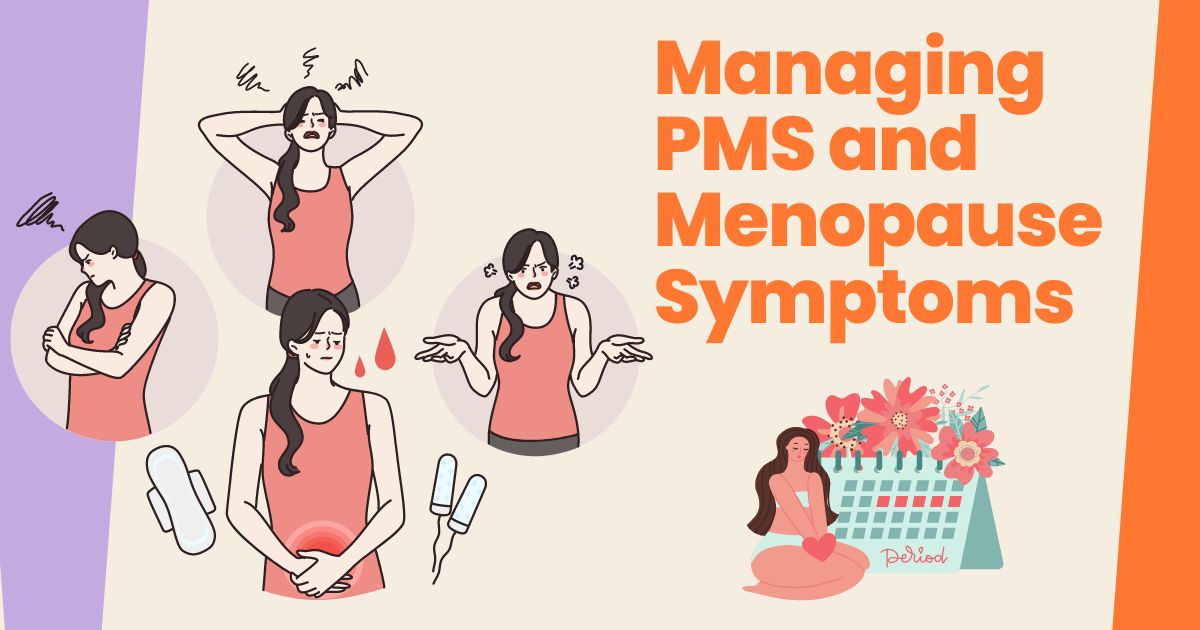Introduction to Managing PMS and Menopause
Premenstrual Syndrome (PMS) and menopause represent significant periods in a woman’s reproductive life, each bringing unique challenges and symptoms. Managing these symptoms effectively can greatly enhance quality of life and overall well-being. This segment delves into the intricacies of PMS and menopause, offering insights and strategies to navigate these phases with greater ease and confidence.
Delving into PMS: Symptoms, Impact, and Management
Premenstrual Syndrome, a condition that affects a multitude of women, manifests through a range of physical and emotional symptoms. These can include mood swings, irritability, depression, bloating, and headaches, often disrupting daily activities and mental health. Understanding PMS is the first step toward effective management, enabling women to identify and address their symptoms proactively.
Key strategies for managing PMS symptoms emphasize lifestyle modifications. A balanced diet rich in whole grains, lean proteins, fruits, and vegetables can stabilize blood sugar levels, mitigating mood swings and cravings. Regular physical activity, whether it’s a gentle walk or a yoga session, boosts mood and alleviates physical discomfort. Additionally, stress-reduction techniques such as meditation or deep breathing exercises can significantly ease emotional symptoms.
For many, tracking symptoms using apps or diaries proves invaluable in understanding and predicting their PMS patterns, facilitating more targeted interventions. Importantly, when lifestyle adjustments fall short, consulting healthcare providers for potential medical treatments or supplements like calcium or vitamin B6 can offer further relief.
Navigating Menopause and Perimenopause: A Comprehensive Guide
Menopause, marking the end of a woman’s menstrual cycles, is preceded by perimenopause, a transitional phase with its own set of symptoms like hot flashes, sleep disturbances, and mood changes. Acknowledging these changes and adopting individualized strategies can significantly ease the transition.
Diet again plays a crucial role, with certain foods like soybeans, flaxseed, and lentils recommended for their phytoestrogen content, potentially alleviating hot flashes. Physical activity remains a cornerstone of symptom management, not only aiding in weight control and sleep quality but also in mood regulation. Identifying and avoiding hot flash triggers, such as spicy foods or warm environments, can also provide relief.
Moreover, joining support groups offers emotional solace and practical advice, creating a community of understanding and shared experiences. For those encountering severe symptoms, medical interventions like hormone replacement therapy (HRT) or other prescription medications may be necessary, always under the guidance of a healthcare professional.
Advanced Strategies for Managing PMS and Menopause Symptoms
Navigating the complexities of menopause requires understanding and addressing a wide range of symptoms. This part of our discussion focuses on medical interventions, support systems, and frequently asked questions about managing menopause and PMS symptoms.
Medical Treatments for PMS and Menopause
Effective management of PMS and menopause often necessitates medical intervention, particularly when symptoms severely impact quality of life. Let’s explore some of the medical treatments available:
- Hormonal Therapies: Hormone Replacement Therapy (HRT) is a common and effective treatment for alleviating menopausal symptoms, especially hot flashes and night sweats. However, it’s crucial to discuss the benefits and risks with your healthcare provider.
- Non-Hormonal Prescription Medications: For those who cannot or prefer not to use HRT, non-hormonal medications, including certain antidepressants, can provide relief from menopausal mood swings and hot flashes.
- Vaginal Estrogen: To address vaginal dryness and discomfort, vaginal estrogen creams, tablets, or rings can be effective and have minimal systemic absorption.
Lifestyle Modifications and Support
Lifestyle changes and support systems play critical roles in managing the symptoms of menopause:
- Nutritional Adjustments: Incorporating foods rich in calcium and vitamin D can support bone health, while avoiding triggers like caffeine and alcohol may reduce hot flashes.
- Physical Activity: Regular exercise helps maintain a healthy weight, reduces stress, and improves sleep, all of which are beneficial during menopause.
- Support Networks: Joining menopause support groups provides a platform to share experiences, obtain advice, and find emotional support.
Frequently Asked Questions
- What lifestyle changes can help manage menopause symptoms?
- Maintain a balanced diet.
- Engage in regular physical activity.
- Practice stress-reduction techniques like yoga or meditation.
- When should I consider Hormone Replacement Therapy (HRT)?
- Consider HRT after discussing your symptoms and health history with your healthcare provider to weigh the benefits and risks.
- Are there natural remedies for managing PMS and menopause symptoms?
- Yes, dietary changes, herbal supplements, and relaxation techniques can alleviate some symptoms. Always consult with a healthcare provider before starting any new remedy.
- How can I deal with mood swings during menopause?
- Regular exercise, adequate sleep, and possibly counseling or medication can help. Engaging in hobbies and social activities also contributes to better emotional well-being.
- Can menopause affect my sexual health?
- Yes, menopause can lead to changes in sexual desire and vaginal health. Vaginal lubricants and estrogen therapies can help with discomfort.
- What should I do if menopause symptoms interfere with my daily life?
- Seek guidance from a healthcare professional to explore treatment options tailored to your needs and lifestyle.
